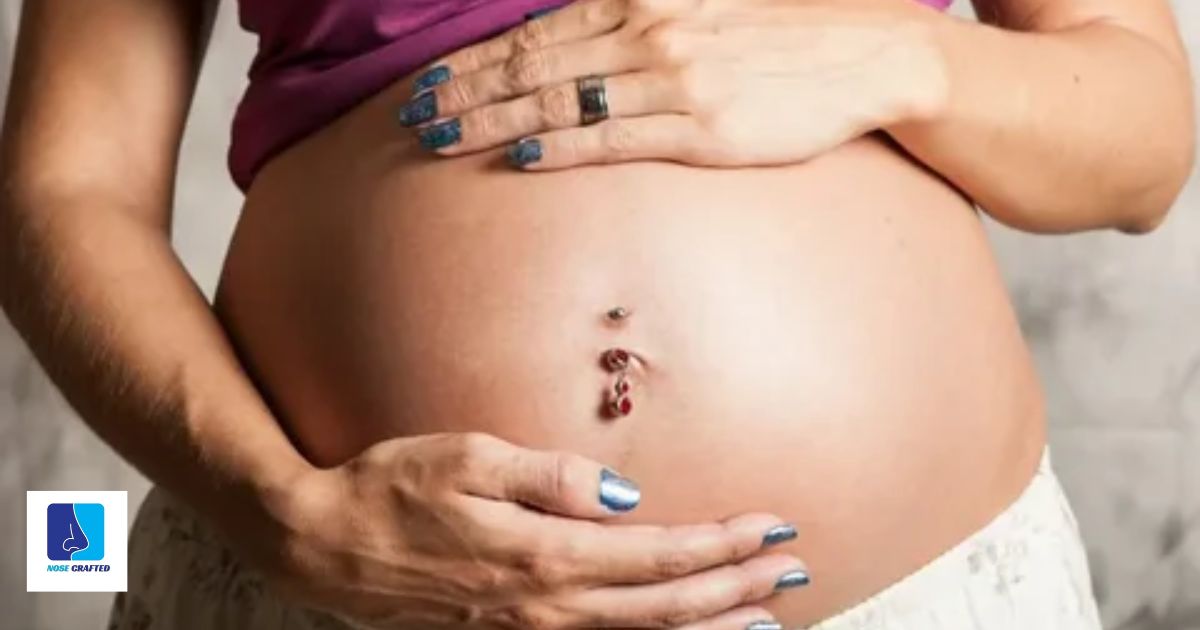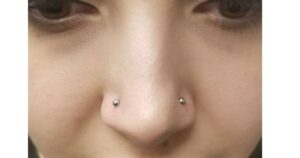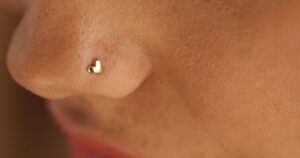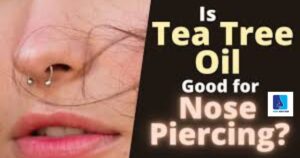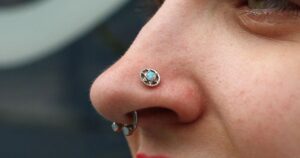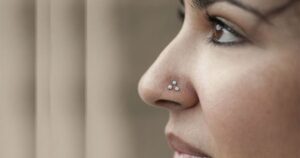Nose piercing is a form of body modification where a small hole is made in the nose to insert jewelry. It’s a cultural practice dating back centuries, with various meanings across different societies. It’s popular among diverse demographics for self-expression and fashion. Careful hygiene and aftercare are crucial to prevent infections.
Curious about nose piercings during pregnancy? Wonder no more! Discover the safety concerns and expert advice in this quick read. If you’re expecting and considering a nose piercing, let’s explore what you need to know to make an informed decision.
Getting a nose piercing while pregnant raises concerns due to potential risks of infection and complications. It’s generally advised to postpone piercings until after childbirth to prioritize the health and safety of both the mother and the baby. Consultation with a healthcare provider is crucial for personalized guidance during pregnancy.
Can I get a piercing while pregnant?
Piercing while pregnant can pose risks to both the mother and the baby due to potential infections and complications. It’s generally recommended to avoid any unnecessary procedures during pregnancy, including piercings, to prioritize the health and safety of both individuals. However, if you’re considering a piercing while pregnant, it’s essential to consult with your healthcare provider to assess the risks and make an informed decision.
- Pregnancy alters the body’s immune system, making it more susceptible to infections, including those resulting from piercings.
- Piercing procedures involve the risk of bleeding, which can be heightened during pregnancy due to increased blood volume and changes in blood circulation.
- Certain piercing areas, such as the belly button or nipples, may undergo significant changes during pregnancy, affecting the healing process and potentially leading to complications.
- Infections from piercings can pose risks to the fetus, including the potential for preterm labor or birth defects.
- Hormonal changes during pregnancy can affect skin sensitivity and healing, potentially prolonging the recovery time for piercings.
- Many professional piercing studios may refuse to perform procedures on pregnant individuals due to liability concerns and ethical considerations.
- If you’re adamant about getting a piercing while pregnant, discuss your plans with your obstetrician or midwife to assess the risks and receive personalized guidance.
Should I take out my piercings during pregnancy?
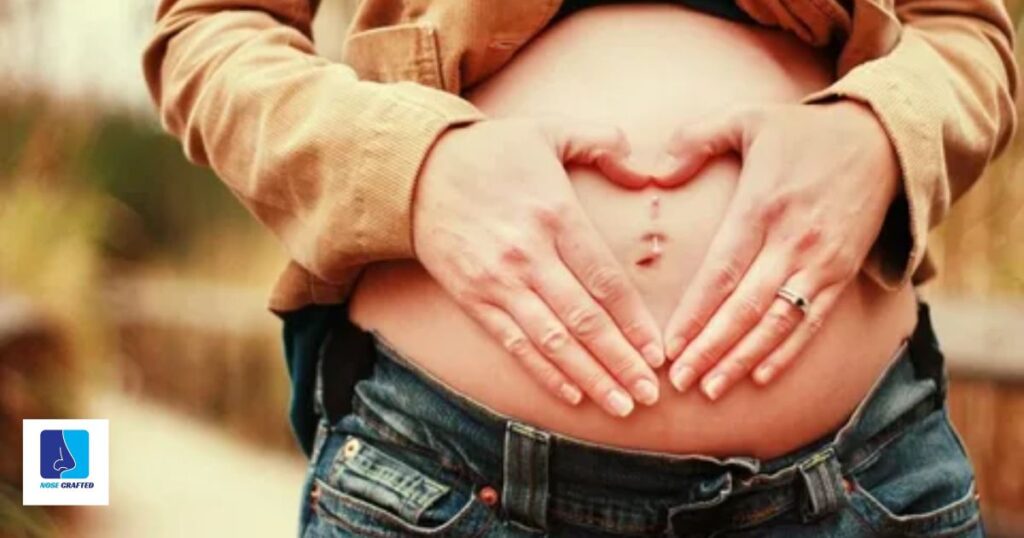
During pregnancy, many individuals wonder whether they should remove their piercings. Here are some key points to consider:
- Risk of Infection: Piercings may increase the risk of infection during pregnancy due to changes in the body’s immune system.
- Potential Discomfort: As the body changes during pregnancy, piercings might become uncomfortable or pose a risk of irritation.
- Healing Process: Piercings may take longer to heal during pregnancy due to slower wound healing and increased blood flow to certain areas.
- Weight Gain: Piercings in areas prone to stretching, such as the belly button, may be affected by weight gain during pregnancy.
- Hormonal Changes: Hormonal fluctuations during pregnancy can impact the body’s response to piercings and increase the risk of complications.
- Consultation: It’s advisable to consult with a healthcare provider and a professional piercer for personalized advice based on individual circumstances.
- Personal Preference: Ultimately, the decision to remove piercings during pregnancy depends on personal comfort levels, health considerations, and professional guidance.
While some may opt to remove their piercings during pregnancy for safety and comfort reasons, others may choose to keep them in with proper care and monitoring. Each person’s situation is unique, so it’s essential to prioritize both maternal and fetal well-being when making this decision.
Belly button rings and pregnancy
Belly button rings and pregnancy can be a concern for many expectant mothers. During pregnancy, the body undergoes significant changes, including the expansion of the abdomen. This expansion may affect the placement and comfort of belly button rings. Some women find that their belly button piercings become uncomfortable or even painful as their belly grows. It’s essential to prioritize your comfort and well-being during this time. If you’re considering alternatives or looking for expert advice, explore options like Nose Piercing Near Me to ensure you make choices that align with your changing needs.
Additionally, there’s a risk of infection or irritation associated with belly button piercings during pregnancy. The skin around the piercing may stretch, making it more susceptible to tearing or developing an infection. It’s essential to keep the area clean and dry to reduce the risk of complications.
Many healthcare providers recommend removing belly button rings during pregnancy to minimize the risk of complications. However, if a woman chooses to keep her piercing, she should monitor it closely for any signs of infection or discomfort. Regular cleaning with a saline solution can help keep the area clean and reduce the risk of infection.
Ultimately, the decision to keep or remove a belly button ring during pregnancy is a personal one. It’s essential to prioritize the health and safety of both the mother and the baby. Consulting with a healthcare provider can provide guidance and support in making the best decision for individual circumstances.
Can you get your nose pierced while pregnant?
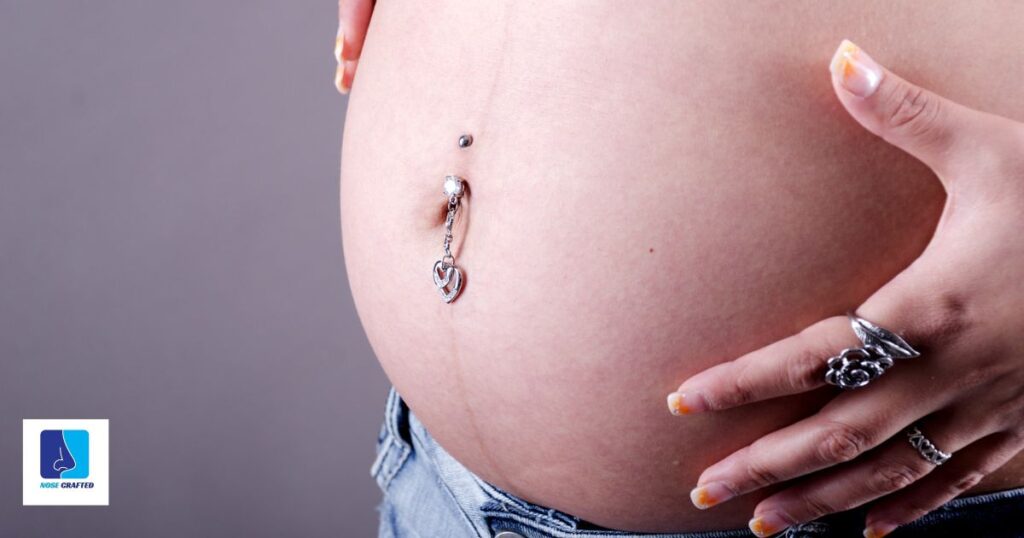
Piercing your nose while pregnant is a topic that requires careful consideration. While some may be tempted to enhance their style during pregnancy, it’s essential to prioritize the health and safety of both the mother and the unborn child. Many healthcare professionals advise against getting any new piercings during pregnancy due to the increased risk of infection and potential complications.
Additionally, the body undergoes significant changes during pregnancy, which can affect how piercings heal and increase discomfort. Therefore, it’s generally recommended to wait until after childbirth before considering any new piercings to minimize risks and ensure the best possible outcome for both the mother and the baby. Consulting with a healthcare provider is essential to make an informed decision tailored to individual circumstances and health considerations.
Can you get your ears pierced while pregnant?
Getting your ears pierced while pregnant is a topic of concern for many expectant mothers. While there’s no definitive evidence suggesting that ear piercing poses significant risks during pregnancy, it’s generally recommended to avoid unnecessary procedures during this time. The body undergoes hormonal changes and heightened sensitivity, increasing the risk of complications such as infections or allergic reactions.
However, if you’re determined to get your ears pierced while pregnant, it’s essential to consult with your healthcare provider first. They can offer personalized advice based on your individual health circumstances. Additionally, choose a reputable and hygienic piercing studio, and ensure proper aftercare to minimize any potential risks.
Nipple piercing and pregnancy
Nipple piercing and pregnancy often raise questions regarding safety and potential complications. While some women may consider getting nipple piercings before pregnancy for aesthetic reasons, it’s essential to understand the implications during gestation and breastfeeding. Nipple piercings can interfere with breastfeeding due to potential damage to milk ducts and increased risk of infection. Therefore, many healthcare professionals advise against getting or maintaining nipple piercings during pregnancy to minimize complications.
Here are seven key points to consider regarding nipple piercing and pregnancy:
- Nipple piercings may cause discomfort and sensitivity changes during pregnancy due to hormonal fluctuations.
- Piercings can increase the risk of mastitis, an infection of the breast tissue, especially during breastfeeding.
- Scar tissue from healed piercings may affect milk flow and hinder successful breastfeeding.
- Removing nipple jewelry during pregnancy is recommended to reduce the risk of injury or infection to the breast tissue.
- Nipple piercings should be fully healed before attempting breastfeeding to minimize complications.
- Consulting with a healthcare provider is crucial for personalized advice on nipple piercing maintenance and breastfeeding concerns during pregnancy.
- Ultimately, prioritizing the health and well-being of both the mother and the baby is paramount, and decisions regarding nipple piercings should be made with careful consideration of potential risks.
Genital piercings and pregnancy
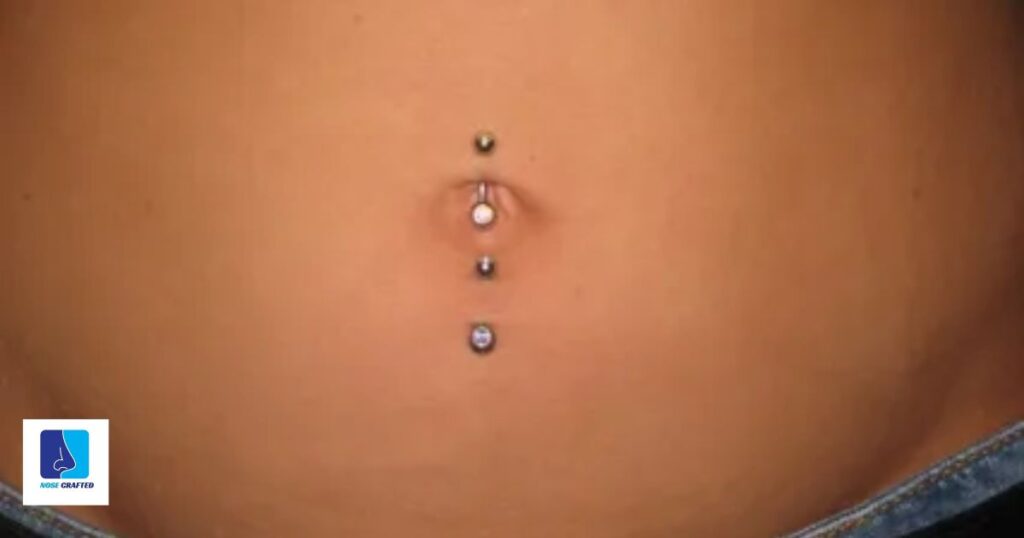
Genital piercings during pregnancy can raise questions about safety and potential risks. It’s essential to understand the implications and consult with a healthcare provider before making any decisions. Some individuals may choose to remove their genital piercings during pregnancy to avoid discomfort or potential complications.
During pregnancy, the body undergoes significant changes, including hormonal shifts and increased blood flow. These changes can affect the healing process of piercings and may increase the risk of infection or other complications. Additionally, the expanding abdomen and physical changes may cause discomfort or irritation around the piercing site.
Healthcare providers generally advise against getting new genital piercings during pregnancy due to the increased risk of infection and potential harm to the fetus. However, if you already have genital piercings before pregnancy, it’s essential to discuss your situation with your healthcare provider. They can offer personalized guidance based on your specific circumstances and help you make informed decisions about whether to keep or remove the piercings.
Ultimately, the decision to keep or remove genital piercings during pregnancy is a personal one that should prioritize the health and safety of both the mother and the baby. Open communication with a healthcare provider and careful monitoring of the piercing site are crucial throughout pregnancy to ensure optimal outcomes for both the individual and their baby.
FAQ,s
What piercings can you get while pregnant?
It’s generally recommended to avoid getting any new piercings while pregnant due to potential risks of infection and complications.
How soon after giving birth can you get a nose piercing?
It’s generally recommended to wait until after the postpartum healing period, typically about 6-8 weeks after giving birth, before getting a nose piercing.
Can I get my nose pierced while breastfeeding?
It’s generally recommended to postpone nose piercings while breastfeeding to minimize potential risks of infection or complications.
Do you have to remove piercings when you get pregnant?
It’s recommended to remove piercings during pregnancy due to potential risks of complications and discomfort.
Conclusion
In conclusion, while nose piercings are a popular form of self-expression and fashion, it’s essential to prioritize safety and hygiene, particularly during pregnancy. Considering the potential risks of infection and complications, it’s generally advisable to postpone getting a nose piercing until after childbirth. Consultation with a healthcare provider can provide personalized guidance based on individual circumstances, ensuring the health and safety of both the mother and the baby. Ultimately, making informed decisions and prioritizing well-being is key in any body modification journey.
Similarly, when it comes to genital piercings during pregnancy, careful consideration and consultation with a healthcare provider are paramount. While existing piercings may pose risks of discomfort and infection during pregnancy, the decision to remove them should be made on a case-by-case basis. Prioritizing the health and safety of both the mother and the baby is crucial, and open communication with a healthcare provider can offer valuable guidance throughout the process. By taking appropriate precautions and making informed choices, individuals can navigate their piercings journey with confidence and ensure a safe and healthy pregnancy experience.
